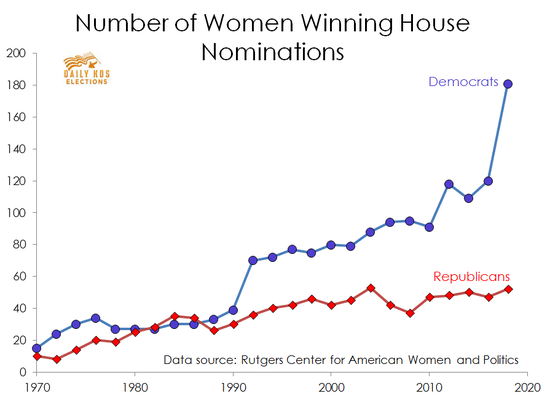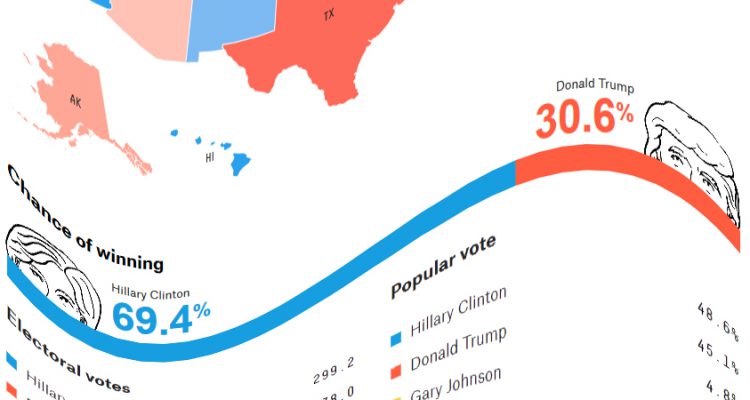By: Richard W. Sharp
Remember the last time you were feeling this giddy about an election?
All the polls pointed to victory and there was talk of a blue shift in the electoral map. Talk turned into money spent and days campaigned in places that so recently had seemed out of reach. That’s right, it was November 8, 2016. Then you woke up on November 9 to the Trumpster fire of the vanities.
Well here we go again. In this must-win midterm, Democrats are looking strong in the polls (Dems’ chances of taking the House are about 80/20 over at the FiveThirtyEight and the Iowa Electronic Markets). The blue wave is coming. And Republicans are even worried about Ted “My Numbers Make Trump’s Numbers Look Good” Cruz… in Texas!
Hold it. Did you say 80/20 with two months to go before the midterm elections? That sounds familiar. Oh yeah, that’s where Hillary’s numbers were in the first week of October, 2016. Now don’t panic. The numbers are good and reliable. The only thing we have to fear is irrational exuberance. Time to keep your eye on the ball, buckle down, and focus on the fundamentals of winning.1
Who are you going to believe, experience or the lying polls?
The polls caught a lot of flack in 2016, but they were no more or less accurate than they have been in the past. The truth is that 70/30 (the election day odds) is far from a slam dunk.2 The thing about 2:1 odds is that, quite often, the 1 wins.
So why were we so certain it was in the bag? Well, as human beings, we’re just not very reliable when it comes to thinking about probabilty.3 In fact, we can get downright emotional, and we have a tendency toward overconfidence.
Consider the weather. What does it mean to you when the forecast calls for rain? What’s that? You wish you had a dollar for every time you that stupid @(#$*! weather guy was wrong about rain? Yeah, tell me about it. Also, tell me how often you think a 70% chance of rain actually pans out.4
Now let’s make it interesting. I’ll take that bet – but you owe me $1 for every time the forecaster is right. How confident are you feeling now? If we’re talking about an average year in Seattle, and an average weatherman, then you owe me an average of $77.5 That’ll get me a nice bottle of scotch for a cold rainy day. So what’s the point here? Once we turned this into an experiment with your wallet instead of an exercise in armchair quarterbacking, you probably started thinking a little harder. The way you felt about the problem changed; there was an emotional response. And emotions don’t help you think rationally about outcomes.
Back to politics. The odds of taking back the House are good, but it now is no time to get overconfident.
Focus on the Fundamentals
OK, so what’s it going to take to win? It is essential to break Republicans’ stranglehold on the levers of power, and the most likely scenario for this is to swing the House to Democrats. Because every House seat is up for re-election, but only a third of Senate seats are (most of which have Democratic incumbents), the Senate is a long shot (not impossible, but not likely). Clearly, the House is the priority.
Democrats should not waste time and money on stretch goals. While it is great to see candidates doing unexpectedly well, tackling issues head on, and offering a clear contrast for voters, resources sent to Texas are not being used in must-win Pennsylvania, California, or Minnesota house races. Democrats need to pick up 24 seats in the House (at a cool $1.5 mill a piece). There are lots of winnable seats out there. Let’s spend that effort on an even-odds Republican held seat outside Los Angeles (CA-25), or a seat near Lansing where Trump barely pulled in a majority in ’16 (MI-8), or one of the many open seats emptied by Republicans who suddenly got interested in retirement.
Let’s consider the individual level. Want your representative to be more representative next year? Well, now’s your chance.

Graphic credit: DailyKOS & Rutgers Center for American Women and Politics
Trump’s Electoral College victory spurred a record-breaking number of women to run for office and win primaries (though pretty much only on the Democratic side). Now’s your chance to back them (or groups that explicitly support them like Emily’s List) with money or time and shift fraction of women in the House from 20% to something a little more like real life.
Looking for more to do? Get people registered to vote (there’s 50 days left, and that’s plenty of time), and help get people to the polls (psychologically and physically). Even something as simple as telling other people that you will be voting and asking if they will too can be effective in boosting turnout.
There’s eight weeks to go, the polls are looking good, but we need to keep our heads clear and our eyes on the prize. Hit it.
Notes:
1 This kind of winning (not this kind). ^
2 “Slam dunk” is high on the list of phrases best heard on ESPN, not C-SPAN (Woodward, Plan of Attack (2004) – if you liked this, you may also like this author’s recent work: Fear: Trump in the White House (2018)).^
3 Kahneman, Thinking, Fast and Slow (2011)^
4 It depends. For the curious, here’s a primer on Probability of Precipitation, but good luck finding historical forecast data (and drop me a line if you do).^
5 OK, so take this number with a healthy grain of salt, but the point holds: forecasters earn their keep. It’s a ballpark estimate based on the average annual number of days of rain in Seattle, some general analysis of the accuracy of forecast precipitation, and some handy definitions. ^

No Comments on "Overcoming overconfidence: Polls don’t win midterm elections, voters do"